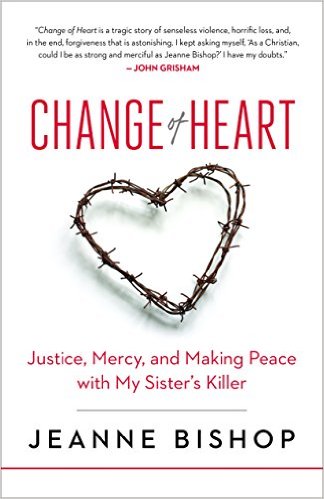
Change of Heart: Justice, Mercy, and Making Peace with My Sister's Killer
By Jeanne Bishop
Westminster John Knox Press
2015
159 pages
Jeanne Bishop, a Cook County, Illinois, public defender, starts her story of reconciliation, “Change of Heart,” on a cold winter day, her shoes crunching on the gravel of the Pontiac Correctional Center visitors' parking lot. After nearly 23 years, today Bishop would meet face-to-face with the man convicted of murdering Bishop's sister Nancy, Nancy's husband and Nancy's unborn child.
The murders had shocked the town of Winnetka, a wealthy Chicago suburb on the Lake Michigan shore. The town, the set of “Home Alone,” “Ferris Bueller's Day Off” and “The Breakfast Club,” stood in for a generic, moated and exclusive vision of the American dream.
Bishop describes the murders, which took place down the steps to the basement of her sister's suburban town home. Richard Langert, Bishop's brother-in-law, killed execution style. Nancy shot in her abdomen, left to bleed out on the floor, crawling to lie next to her husband and using her blood to leave a message: “<3 U”.
Recounting the scene, Bishop prays, asking for God to take this pain from her.
A local high school junior, David Biro, was convicted of the crime. Biro never admitted guilt and was sentenced as a minor to life without parole. “We'll never see him again,” Bishop's mother said after sentencing.
The murder shocked Bishop into moving from the periphery of civil rights, where she assisted Irish immigrants, to leave global law firm Mayer Brown and join the Cook County public defender’s office. Although Bishop hints that she came into contact with other juveniles who were accused of crimes as heinous as Biro's, she does not assign weight to those experiences and they are never given enough illumination in the story.
Her exit from Mayer Brown, which was probably a transformative moment, is given passing attention.
We are left wondering how those experiences influenced Bishop's developing sense of the moral emptiness of juvenile life without parole.
Now a public defender, Bishop notes that although she recognizes the horror of the crime she is sometimes asked to defend and her duty as the accused’s lawyer, the families of victims have a right to not see the accused walking free.
Instead of these professional interactions, it is exposure to other activists including Rubin “Hurricane” Carter and Sister Helen Prejean that headline Bishop's moment on the road to Damascus.
In the years after her sister's murder Bishop notes she never uttered the name of David Biro.
“That felt like a kind of victory to me,” she writes.
But an essay by Randall O'Brien, a university president and author, challenged her strategy. Bishop called O'Brien demanding to know what reconciliation with Biro would look like. O'Brien replied, “It would look like Jesus on the cross.”
Bishop says she started to cry. O'Brien challenged Bishop, asking her to bring Biro into a relationship with God.
Her story of struggling with her faith, with family members, interactions with the spiritual and even other members of her faith community are told in a very personal way. It is clear that Bishop's deep faith led her to a decision to write a letter to Biro.
“You know who I am,” Bishop started.
Biro responded. “I know that for a long time you and your family have been looking for me to confess to the murders I committed ... I am guilty.”
Shortly after receiving that letter Bishop was walking across that gravel lot. She says she will never forget her sister Nancy and reminds Biro of his act and its consequences. But, she says, she has been changed from the woman who demanded the permanent incarceration of the high school student Biro to a woman who campaigns for parole to be considered for such minors.
Bishop believes her journey has led to the possibility of Biro finding God's grace once more.
This is a stunning story of personal discovery and forgiveness. You may find yourself discussing Bishop's actions with friends and clergy. You will find yourself challenged, wondering if you could find the strength to act on your beliefs as Bishop did. It is written by an attorney but speaks from the heart.
Patrick Boylan is a freelance writer in Chicago. In 1990 he covered this murder trial for The Irish Echo.